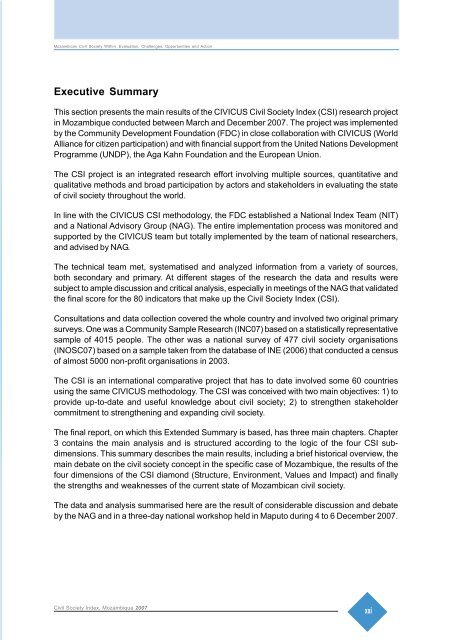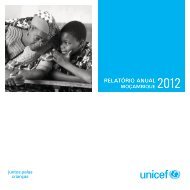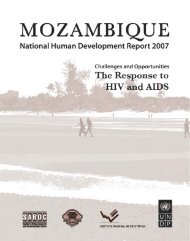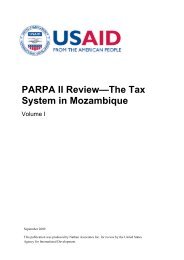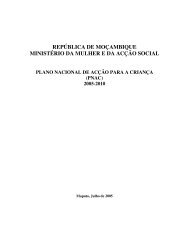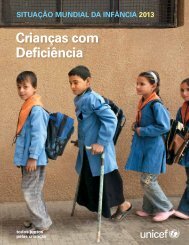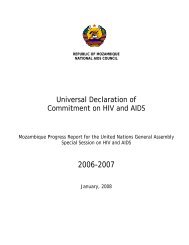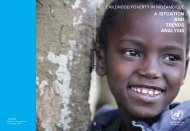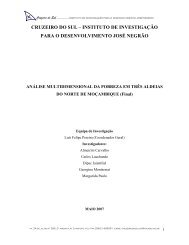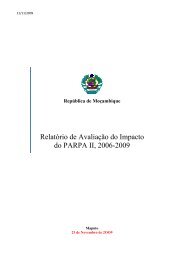Mozambican Civil Society Within: - UNICEF Mozambique - Home page
Mozambican Civil Society Within: - UNICEF Mozambique - Home page
Mozambican Civil Society Within: - UNICEF Mozambique - Home page
Create successful ePaper yourself
Turn your PDF publications into a flip-book with our unique Google optimized e-Paper software.
<strong>Mozambican</strong> <strong>Civil</strong> <strong>Society</strong> <strong>Within</strong>: Evaluation, Challenges, Opportunities and Action<br />
Executive Summary<br />
This section presents the main results of the CIVICUS <strong>Civil</strong> <strong>Society</strong> Index (CSI) research project<br />
in <strong>Mozambique</strong> conducted between March and December 2007. The project was implemented<br />
by the Community Development Foundation (FDC) in close collaboration with CIVICUS (World<br />
Alliance for citizen participation) and with financial support from the United Nations Development<br />
Programme (UNDP), the Aga Kahn Foundation and the European Union.<br />
The CSI project is an integrated research effort involving multiple sources, quantitative and<br />
qualitative methods and broad participation by actors and stakeholders in evaluating the state<br />
of civil society throughout the world.<br />
In line with the CIVICUS CSI methodology, the FDC established a National Index Team (NIT)<br />
and a National Advisory Group (NAG). The entire implementation process was monitored and<br />
supported by the CIVICUS team but totally implemented by the team of national researchers,<br />
and advised by NAG.<br />
The technical team met, systematised and analyzed information from a variety of sources,<br />
both secondary and primary. At different stages of the research the data and results were<br />
subject to ample discussion and critical analysis, especially in meetings of the NAG that validated<br />
the final score for the 80 indicators that make up the <strong>Civil</strong> <strong>Society</strong> Index (CSI).<br />
Consultations and data collection covered the whole country and involved two original primary<br />
surveys. One was a Community Sample Research (INC07) based on a statistically representative<br />
sample of 4015 people. The other was a national survey of 477 civil society organisations<br />
(INOSC07) based on a sample taken from the database of INE (2006) that conducted a census<br />
of almost 5000 non-profit organisations in 2003.<br />
The CSI is an international comparative project that has to date involved some 60 countries<br />
using the same CIVICUS methodology. The CSI was conceived with two main objectives: 1) to<br />
provide up-to-date and useful knowledge about civil society; 2) to strengthen stakeholder<br />
commitment to strengthening and expanding civil society.<br />
The final report, on which this Extended Summary is based, has three main chapters. Chapter<br />
3 contains the main analysis and is structured according to the logic of the four CSI subdimensions.<br />
This summary describes the main results, including a brief historical overview, the<br />
main debate on the civil society concept in the specific case of <strong>Mozambique</strong>, the results of the<br />
four dimensions of the CSI diamond (Structure, Environment, Values and Impact) and finally<br />
the strengths and weaknesses of the current state of <strong>Mozambican</strong> civil society.<br />
The data and analysis summarised here are the result of considerable discussion and debate<br />
by the NAG and in a three-day national workshop held in Maputo during 4 to 6 December 2007.<br />
<strong>Civil</strong> <strong>Society</strong> Index, <strong>Mozambique</strong> 2007<br />
xxi


